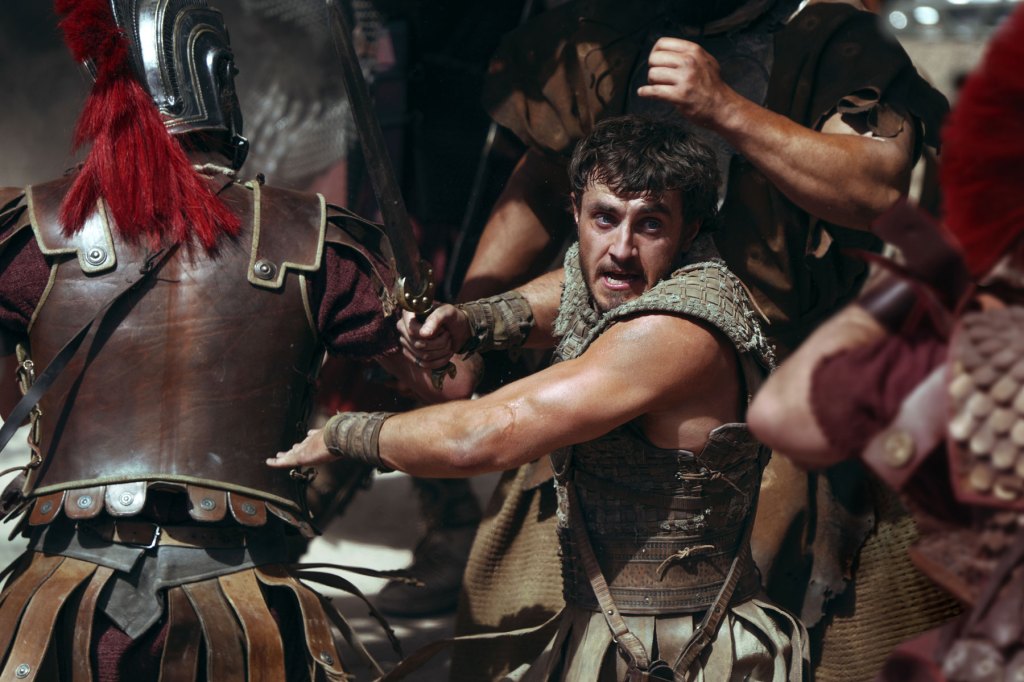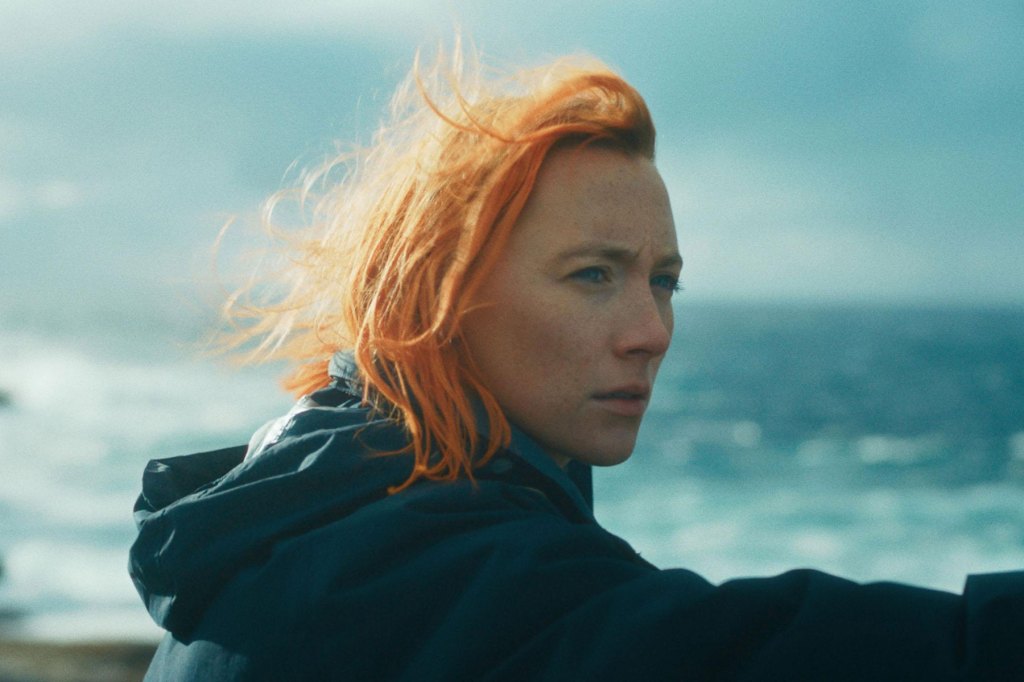Cate Blanchett on ‘Rumours’ and getting lost in the woods
Set in a German forest that is beset by zombies and home to a giant brain, the black comedy Rumours may seem an unlikely vehicle for Cate Blanchett. But as the Australian actress tells InReview, it’s surprisingly topical – and political.
Cate Blanchett exerted a political presence in Cannes this year, although Rumours – the satirical film where she plays a bureaucratic, lustful German Chancellor hosting a G7 summit – was more a lark than a strong political statement. It was at a press conference on cinema about refugees where, in her capacity as a UN Goodwill Ambassador, the Australian actress spoke about having recently travelled to Africa. She said her “interactions with refugees in the field” had totally changed her perspective on the world.
“There are so many stories to be told that are so inspiring and unusual and off-the-cuff,” she said.
The evening before, Blanchett had walked the red carpet for the premiere of the film The Apprentice wearing a gown incorporating the colours of the Palestinian flag. Last November, she had advocated for Gaza at the European Parliament, calling for a ceasefire and an end to the targeting of the unarmed Palestinian population. Together with other Hollywood entities, she had also signed an Artists4Ceasefire open letter to Joe Biden calling for an end to the war.
While Rumours does not aim to tackle any of the world’s issues, it does poke fun at the political process – it is named after the Fleetwood Mac album recorded when band members were at each other’s throats.
Directed by Guy Maddin (The Saddest Music in the World) and fellow Canadians Evan and Galen Johnson, the story follows the G7 world leaders as they meet at a vast Gothic estate in a secluded German forest to draft a statement on a global crisis, only to face a crisis themselves as they are beset by a horde of unearthed “bog men” from the Iron Age – aka zombies. They also discover a giant brain perched ominously in the woods, and there’s an AI chatbot bent on catching the leaders committing an internet child sex crime.
Blanchett was an executive producer on the movie, which was mostly filmed at night.
“When Guy approached me about this, I thought we’d be shooting in Winnipeg, where he lives,” says Blanchett, who resides in the UK.
“And all of a sudden we were in a forest in Budapest doing five weeks of night shoots. I’d never done that many night shoots back-to-back, but there was something magical about it. I mean, it’s the good side of being a shift worker – and not that I wish shift work upon anybody.
“You’d wake up at two in the afternoon, but my kids were with me, so we woke up earlier than that. So it was a bit like being at a slumber party. It felt like something only we would understand, a bit like the characters.”

Rumours features a star-studded ensemble cast.
Blanchett says the film is about what might happen if all the elements of the politicians’ lives, their positions and their relationships dropped away.
“It just suddenly changes and they’re in this altered state. I think that somehow the setting, the atmosphere, the tone and the image that they finally look out on seems much more possible than it did 15 years ago. But if you talk about things in a head-on way, you lose an audience.
“The film is drawing on the collective anxiety and despair that any thinking person is probably feeling, but it’s also inviting an audience to laugh at it and feel like they can maybe go out slightly refreshed and more purposeful. If it makes them talk about those things, I think it’s fantastic.”
But can politicians take the joke?
“I think any leader worth their weight in salt has a sense of humour about themselves,” Blanchett replies. “It’s like when you go to the correspondents’ dinners in America or the National Press Club in Australia where they do all the political roasts. You think okay, yeah, I might approach trusting you. It’s when those people don’t have a sense of humour that I start to worry.”
Is she an optimist or a pessimist?
“I think probably an optimistic pessimist. You know, plan for the worst, hope for the best.
“I don’t like making fun of the state of the world. I love the world. But I don’t think that what we’re doing to the planet, the systemic fiscal inequality, is at all amusing.
“But [it is a good thing] if you can satirise it, and invite people to see it and talk about it, because the best way to head towards the deep-throated apocalypse is to not talk about it, to think it’s somebody else’s problem, and to be inert and inactive and disengaged.
“What I love about cinema is it asks you to engage in worlds of someone else’s invention and imagine your way into different storylines.”
Is that easier to do it with comedy?
Subscribe for updates
“I feel like this is as much a comedy or a satire or a tragedy, and I’d have never seen the current state of affairs played out with that particular tone.
“It’s a zombie movie and it’s a Mexican soap opera. We were discovering the tone as we went along and Guy always has a unique perspective. He’s really playful and wicked and naughty, but also soulful and yearning and so full of self-reflection.”
As for AI, Blanchett says she can’t believe there isn’t more of a discussion about it.
“It affects all of us, but none of us have the power to be able to vote on this issue. We’ll have a referendum about an Indigenous Voice to Parliament, but who’s having the referendum on AI and whether we want certain companies to be able to control our identity?
“I have four kids, so I think about what’s going to happen in the future and I’m frequently overwhelmed.”
Are her kids overwhelmed?
“No, my kids are strangely optimistic. I have robust discussions with them and I’m grateful for their perspective on the world, their energy and their honesty about what they see and what they find reprehensible, you know – the wars, the conflicts that are going on, and the way that they are being kind of massaged away.”
In creating her German Chancellor with blonde bouffant hair for Rumours, she says there are certain signifiers of what represents a powerful woman in politics.
“There has to be a block colour, not alienating, and your hair has to be a certain way. There’s an iconography to it about the gestures, the way that women have to use those bow gestures, and you can just see them being coached. They’re so separated from themselves, and the more they live in public life their voice changes – they don’t want to go up at the end of the sentences or whatever.”

The forest setting of Rumours is home to a giant brain.
Blanchett has a strong relationship with Germany.
She invited Berlin-based Schaubühne Theatre’s production of Hamlet (starring Lars Eidinger) to Australia when she was director of the Sydney Theatre Company (with her husband Andrew Upton), and she created and starred in the Australian mini-series Stateless, which premiered at the Berlin Film Festival, as did Steven Soderbergh’s The Good German, in which she starred alongside George Clooney. Her portrayal as the fictitious German conductor Lydia Tár won her an Oscar.
“I said to Guy, ‘You do know that I don’t speak German, so why do you want me?’,” Blanchett recalls. “He said, ‘Well, I’ve always wanted to work with you.’ I guess he was thinking, what else can I play? I could have maybe played the big brain! But I’ve been profoundly influenced by German theatre and physical dance, and some of my favourite performing artists are German.”
Blanchett also currently appears as the older version of Leila George in Alfonso Cuarón’s AppleTV+ mini-series Disclaimer, which she executive-produced.
She has re-teamed with Soderbergh for the spy drama Black Bag, releasing in March, and she has also re-teamed with her Coffee & Cigarettes director Jim Jarmusch on the upcoming Father, Mother, Sister, Brother, the story of estranged siblings who reunite after years apart.
She is – as usual – very busy.
Rumours screens in cinemas from December 5.

